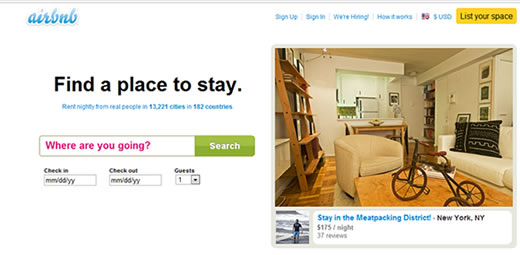Airbnb, the Un-Hotel Reservation Site, Valued at $1 Billion
Airbnb (short for Airbed and Breakfast), a marketplace for travel room and apartment rentals is raising $100 million at a valuation of $1 billion. {TechCrunch} That’s quite some airbed.
The company, which even offered to rent out the entire country of Liechtenstein for $70,000/night at one point, has booked more than 1.6 million nightly stays to date and experienced growth of more than 800% last year. Liechtenstein is off the table now, but there’s still a charming little castle available if you want an example of how far the site’s com from its airbed roots.
TechCrunch reports that on any given night, there are more people staying in rooms via Airbnb than there are rooms available in the largest Manhattan hotel.
Unfortunately, a recently passed New York State law makes it illegal to rent apartments for less than 30 days, so some of that new money might go towards defending against lawsuits. Depending on how successful Airbnb becomes as a hotel alternative in one of the world’s most popular tourist destinations, we can see those lawsuits getting quite costly.
We can see both sides of the issue. If you’re staying in a major city for more than a week, it really is more cost effective to rent a room or an apartment. Â As someone who has done just that, Airbnb provides a clean, well-lit alternative to wading through the murky myriad of Craigslist postings offering 2 bedroom Soho apartments with an Ocean view for $70/night (read: the obvious scams).
On the other hand, there are some people who are obviously taking apartments strictly for the purposes of renting them on a nightly or weekly basis. If you’re looking for affordable housing in New York on a permanent basis, it’s certainly harder to compete against the potential income from rental income versus monthly income. In theory, that reduces availability and ends up driving up costs for residents. Not to mention that contrary to their reputation for being super friendly and welcoming, most New Yorkers aren’t so warm on the thought of having multiple, random neighbors. Stuytown Lux Living is particularly vocal in their dissatisfaction with the Airbnb model.
So who wins? For now, it seems Airbnb is. It’s successfully brought some order to a market that was previously unorganized for the most part; and for as disruptive as it may be to local hoteliers and apartment hunters alike, at peak times when hotels have no inventory Airbnb keeps tourist dollars coming into the local economy, and lets leasing companies continue to keep apartment rentals an owners’ market.

